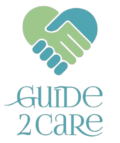Frequently Asked Questions
Frequently Asked Questions
General Questions
What agency will address my health care and social care needs?
Guide2Care™ LLC connects you with experienced independent patient advocates dedicated to addressing your social service and health care needs. Our advocates come from diverse professional backgrounds including social work, health coaching, nursing, and community health yet are unified by their deep knowledge and commitment to your well-being. Each advocate is thoroughly screened, closely supported, and prepared to handle your matters with the care and concern you deserve
What is the role of independent patient advocate?
Independent patient advocates leverage their expertise to support individuals in navigating the complex healthcare and social systems, ensuring they receive comprehensive and quality care. As advocates, they can:
1. Facilitate Communication: Act as a bridge between patients, healthcare providers, and other stakeholders, ensuring clear and effective communication.
2. Coordinate Care: Assist in organizing and coordinating various aspects of healthcare, including appointments, tests, and follow-up care.
3. Provide Information: Offer information and education about medical conditions, treatment options, and available resources to empower individuals to make informed decisions.
4. Advocate for Patient Rights: Safeguard the rights and interests of patients, advocating for respectful and patient-centered care.
5. Navigate Insurance: Help individuals understand their insurance coverage, navigate billing issues, and explore financial assistance options.
6. Address Social Determinants: Consider social and environmental factors that impact health, working to address social determinants of health for improved well-being.
7. Support Decision-Making: Assist individuals and their families in making healthcare decisions aligned with their values and preferences.
8. Resolve Issues: Intervene and advocate when issues or challenges arise in accessing healthcare services.
By serving as advocates, social workers and care coordinators play a crucial role in ensuring that individuals receive the support they need for optimal health outcomes.
What level of contact will I have with my advocate?
The level of contact you have with your advocate will depend on the specifics of your social service and/or healthcare matter or situation. When you reach out to us and articulate your circumstances, an advocate will contact you through your preferred method, whether it be a call or email or teleconference. After engaging directly with your advocate, they will assess your situation and determine the necessary social and healthcare assistance tailored to your specific needs.
What should I expect from our first appointment?
In our interactions, we will participate in a thorough conversation regarding your or your loved one’s needs, with the goal of pinpointing the most efficient methods to meet them. Through collaborative efforts, we will devise action steps and set forth explicit agreements concerning time frames and preferred modes of contact, including email, phone, or text.
How much does it cost to get help?
Our programs and sliding-scale pricing ensure advocacy is within reach for all. Because health insurance does not yet cover independent patient advocate services, we offer private advocacy options. Clients may also contribute to our Pay It Forward program, allowing those with more resources to help extend support to others in need. Together, this creates a community where no one is left without guidance or care.
What is your cancellation and refund policy?
Cancellation: Appointments can be canceled with a minimum of 24 hours’ notice.
If you choose to cancel the service entirely, you will receive a final report detailing identified needs, resolution status, and any outstanding needs that were not addressed.
Refund: Due to the personalized nature of the service, refunds cannot be issued.
Health Care Questions
Who is a caregiver?
A caregiver is someone who provides support, assistance, and care to individuals who may need help due to illness, disability, or other challenges. Caregivers can be family members, friends, or hired professionals, offering both emotional and practical support to enhance the well-being of those they care for.
What tasks can a care manager assist caregivers with?
Care managers can help caregivers by coordinating medical appointments, providing information about available support services, offering emotional support, and guiding them through the healthcare and benefit systems. Additionally, they may aid in creating advance directives, managing medications, and connecting caregivers with relevant resources.
What type of coverage is available when I need assistance with dressing, bathing, meal preparation, housekeeping, or shopping?
There are different programs (Medicaid or Expanded In-home Services for the Elderly (EISEP) with unique eligibility requirements that individuals must meet before they can obtain home care services. If you have more questions, please book your next session: Care Coordination Services
What do I need to know before being discharged from a hospital or rehab facility back home?
You need to review the discharge plan including but not limited to the understanding of diagnosis, medications, equipment, doctor’s appointment, home care hours, and skilled services needed in the home.
Need assistance to manage the discharge plan during the hospital stay or after you or your loved one is back home, please schedule your session at Care Coordination Services
